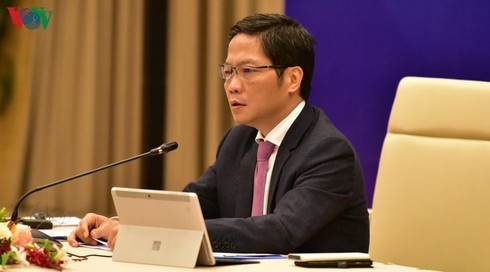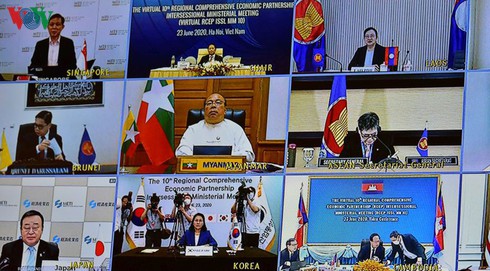pandemic and restore multilateral trade mechanisms.
 |
| Minister of Industry and Trade Tran Tuan Anh gives a speech at the event |
Minister of Industry and Trade Tran Tuan Anh chaired the 10th Meeting on the RCEP in Hanoi on June 23.
During his speech at the meeting, Minister Tuan Anh said that the global fight against the COVID-19 is still ongoing and has served to severely damage the economic activities of many nations that rely heavily on global supply chains.
Despite these conditions, he said that there are opportunities in every challenge and it is vital that RCEP nations make good use of opportunities to promote the goal of economic recovery, as well as regaining a central position amid the global economy.
According to Minister Tuan Anh, the present represents a critical time for RCEP countries to move to accelerate trade and investment co-operation, along with the signing of the RCEP Agreement to offer a positive signal to the world to highlight the spirit of determination among regional nations to overcome all epidemic and economic difficulties.
Amid the context of difficulties caused by the COVID-19 pandemic, RCEP countries are still conducting a wide range of online meetings in an effort to maintain the momentum of negotiations, as well as encouraging greater participation from India in the process.
Amid complicated developments relating to the pandemic, Minister Tuan Anh believes that countries have been aware of the importance of early completion of the RCEP for this year and expresses hope that all participants at the meeting will enjoy wide-ranging discussions.
 |
| Delegates join the online meeting on the Regional Comprehensive Economic Partnership (RCEP) |
In his address, Korean Trade Minister Yoo Myung-hee stated that the COVID-19 is seriously threatening the lives of people as well as the global multilateral trading system. This RCEP meeting is anticipated to provide an opportunity for countries to affirm their resolve as they strive to overcome the epidemic and restore the multilateral trade mechanisms which have already been severely damaged by the impact of the pandemic.
The signing of the RCEP this year will mark an important driving force for the region and the world in order to promote global economic and trade growth. Furthermore, the partnership will also serve as a basic platform for participants to unite in responding to and repelling the effects of the pandemic, as well as helping to boost the recovery of economies regionally and globally.
The RCEP was originally launched in November, 2012, in Phnom Penh in Cambodia as part of an ASEAN initiative to promote trade between member states and their six partner countries, namely Australia, China, India, Japan, New Zealand, and the Republic of Korea, all of which had independent free trade agreements signed with ASEAN.
After undergoing several rounds of negotiation since 2012 between 10 ASEAN member states and their six dialogue partners, the RCEP is considered to be the largest FTA in the world and features a big market scale of roughly US$25,000 billion, along with more than 2.3 billion people.
Joining the RCEP will serve to promote trade among the group by reducing taxes, standardising customs rules and procedures, along with expanding market access, especially among countries that do not have existing trade agreements. Immediately before the start of negotiations, all nations had agreed to the goal of achieving a comprehensive, high-quality free trade agreement that would benefit all parties involved.
Once the RCEP is fully implemented, it will create a market of roughly 3.5 billion consumers and approximately US$49,000 billion in GDP, accounting for about 39% of global GDP. In particular, it will represent the largest free trade area in the world with commitments outlined on market opening in the fields of goods, services, and investment, alongside simplifying customs procedures and rules of origin as a means of boosting trade facilitation. VOV